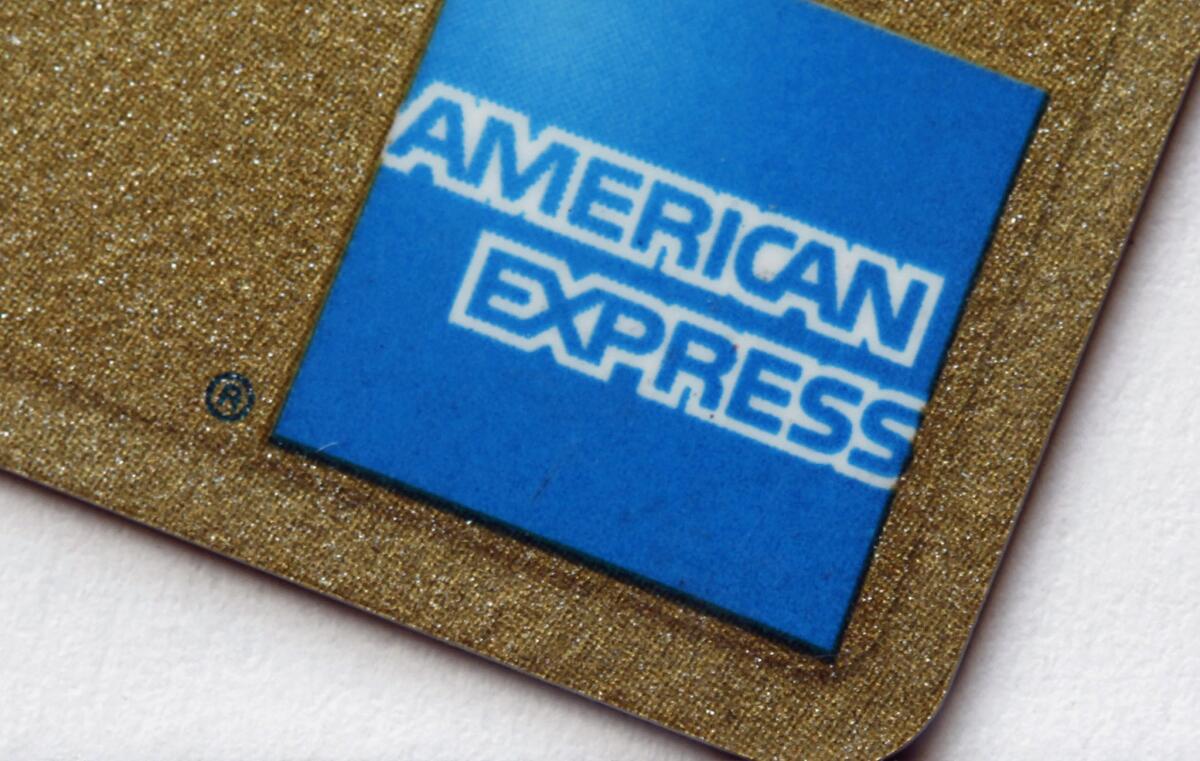AmEx limits on merchants violate U.S. antitrust laws, judge says

- Share via
American Express violated U.S. antitrust laws by barring merchants from asking customers to use one credit card over another, a federal judge ruled Thursday.
The case was a major blow to American Express, which argued that its policies kept it competitive against the larger payment networks of Visa and MasterCard and their bank partners. American Express plans to appeal the decision.
U.S. District Court Judge Nicholas Garaufis said in his ruling that American Express nondisclosure policies harmed competition and prevented merchants from trying to lower their credit card processing costs. He also said AmEx’s policies kept consumers unaware how much using their credit cards cost merchants, which required merchants to pass along those costs in the form of higher prices.
At the center of the case are the fees merchants pay to process credit and debit cards, which have been largely hidden from the average consumer but are a major cost for any merchant who wants to accept plastic. Every time a credit or debit card is used at a merchant, the banks and payment networks take a small percentage of the transaction as a fee.
The fee varies on what type of card is used, but typically debit cards are cheaper for merchants to process than credit cards. The credit cards that gave consumers perks such as reward points, cash back or airline miles, which are the cards American Express offers, were among the most expensive for merchants to process.
Consumers never directly pay for these fees, but merchants must charge higher prices to cover the processing costs.
“Every day merchants make their vendors compete for their business and, hopefully, drive down prices. That type of competition does not exist at all in the payment industry,” said Jeffrey Shinder, an antitrust and payments expert at the law firm Constantine Cannon who represents merchants in a related class action case involving American Express.
American Express required its merchants to accept all credit cards equally, and they could not encourage consumers to use one credit card over another through practices such as signs that say “We Prefer Visa” or potential discounts to Discover cardholders.
Visa and MasterCard used to have similar nondisclosure policies, but ended those practices after settling with the Justice Department in 2010. American Express refused to settle, and the issue went to trial last summer. The company argued at trial that merchants could discriminate against AmEx cardholders due to the higher fees and also argued that, as the third-largest payment network, it was not in a position to stifle competition.
Those arguments were rejected. Judge Garaufis ruled that the loyalty American Express cardholders have for their cards have been often enough to keep merchants accepting American Express cards. Also, while American Express is the third-largest payment network, it is the second-largest credit card network by payment volume.
American Express Co., in a statement, called the decision “wrong.”
“The court’s ruling will not provide any benefit to consumers and will, in fact, harm competition by further entrenching the two dominant networks,” the company said, referring to Visa and MasterCard.
Retailers applauded the decision.
“This is a pretty important step forward, and it vindicates what we’ve said all along: that the credit card market is broken and the consequence has been high fees for merchants and consumers,” said Mallory Duncan, general counsel for the National Retail Federation, which represents most of the nation’s most well-known retail companies.
The ruling will not change American Express’ policies immediately. Judge Garaufis asked both American Express and the Justice Department to submit proposed ideas on how to remedy the situation as a result of the ruling. However, if American Express is required to lower its fees that is likely to have a long-term effect on the company’s profitability and, for consumers, its ability to provide perks like points or airline miles.
Thursday’s news is the latest chapter in what has been a difficult start to the year for American Express. The New York company said in January it would lay off 4,000 employees this year, and this month American Express said its partnerships with Costco and JetBlue would be coming to an end.
American Express shares closed down $1.38 to $78.40 following the ruling. The stock has declined nearly 16% so far this year.
More to Read
Inside the business of entertainment
The Wide Shot brings you news, analysis and insights on everything from streaming wars to production — and what it all means for the future.
You may occasionally receive promotional content from the Los Angeles Times.










